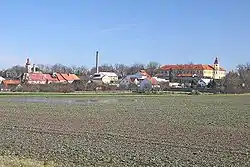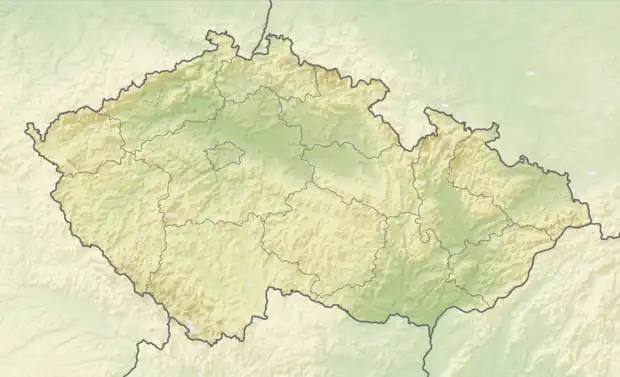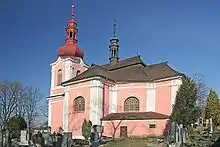Dymokury
Dymokury (German: Dimokur) is a municipality and village in Nymburk District in the Central Bohemian Region of the Czech Republic. It has about 900 inhabitants.
Dymokury | |
|---|---|
 View from the southwest | |
 Flag  Coat of arms | |
 Dymokury Location in the Czech Republic | |
| Coordinates: 50°14′45″N 15°12′9″E | |
| Country | |
| Region | Central Bohemian |
| District | Nymburk |
| First mentioned | 1249 |
| Area | |
| • Total | 14.65 km2 (5.66 sq mi) |
| Elevation | 203 m (666 ft) |
| Population (2023-01-01)[1] | |
| • Total | 906 |
| • Density | 62/km2 (160/sq mi) |
| Time zone | UTC+1 (CET) |
| • Summer (DST) | UTC+2 (CEST) |
| Postal code | 289 01 |
| Website | www |
Administrative parts
Villages of Černá Hora and Svídnice are administrative parts of Dymokury.
Geography
Dymokury is located about 13 kilometres (8 mi) northeast of Nymburk and 49 km (30 mi) west of Prague. It lies in the Central Elbe Table. Two streams, Pivovarský and Štítarský, flow through the municipality. The Štítarský Stream supplies the Pustý Pond.
History
The first written mention of Dymokury is from 1249, when it was a possession of a local noble Soběslav. In 1290, King Wenceslaus II ceded the estates to the Cistercian monks of the Sedlec Abbey near Kutná Hora. After changing owners several times, the fief was purchased by the noble House of Waldstein in 1573, their successors had a Renaissance castle erected from 1614 onwards.[2]
Disseized by Emperor Ferdinand II after the 1620 Battle of White Mountain, Dymokury was acquired by Albrecht von Wallenstein, who nevertheless sold it to the Austrian Khuen von Belasi dynasty shortly afterwards. They resold it to Guillaume de Lamboy, Baron of Cortesheim. From 1673, the House of Colloredo held the manor, which also included the neighbouring town of Městec Králové. They had the castle again rebuilt in a Baroque style, finished in 1787. The last owners are the Counts of Czernin, who were expropriated and expelled after World War II, but regained its possession. The castle was restored after the Velvet Revolution of 1989.[2]
Demographics
|
|
| ||||||||||||||||||||||||||||||||||||||||||||||||||||||
| Source: Censuses[3][4] | ||||||||||||||||||||||||||||||||||||||||||||||||||||||||
Economy
The local economy mainly depends on agriculture. It is mainly a residential village and only a few residents work in Dymokury.
Sights

The landmark of Dymokury is the Church of the Annunciation of the Virgin Mary. The first church in Dymokury was documented in the 14th century, it was destroyed during the Thirty Years' War. The current church was then built in the Baroque style in 1723–1725. It was probably designed by Jan Santini Aichel.[5]
Notable people
- Ottokar Czernin (1872–1932), nobleman, diplomat and politician
- Count Otto von Czernin (1875–1962), nobleman and diplomat
References
- "Population of Municipalities – 1 January 2023". Czech Statistical Office. 2023-05-23.
- "Historie obce" (in Czech). Obec Dymokury. Retrieved 2022-07-04.
- "Historický lexikon obcí České republiky 1869–2011 – Okres Nymburk" (in Czech). Czech Statistical Office. 2015-12-21. pp. 1–2.
- "Population Census 2021: Population by sex". Public Database. Czech Statistical Office. 2021-03-27.
- "Kostel" (in Czech). Obec Dymokury. Retrieved 2022-07-04.